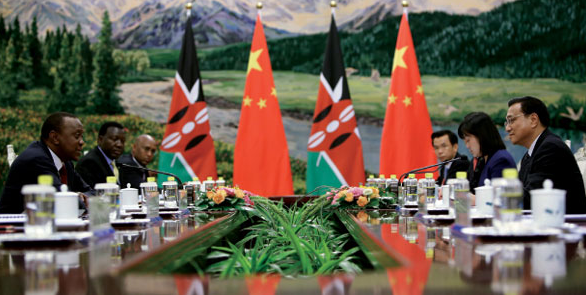Kenya president urges rebalance of China-Africa trade
Are you an expert in some business niche, China – Kenya for example?
if you are, and you want to be the owner in the whole internet of your business niche.
Contact us here mayado@sylodium.com
we will take advantage of your knowledge, you will take advantage of our visionary system.
New from Financial TImes
Kenya president urges rebalance of China-Africa trade
Uhuru Kenyatta calls on Beijing to its open market to more than commodities
President Uhuru Kenyatta of Kenya has called on China to rebalance an increasingly skewed trade relationship between Africa and the rising superpower, arguing that Beijing must do more to tackle a widening trade deficit.
“As with any country, the?.?.?.?trade deficit is an issue of concern and we will be pushing to see how we can increase opportunities for Kenyan goods to penetrate the Chinese market,” Mr Kenyatta said in an interview with the Financial Times. He did not specify which goods Kenya hoped to export or precisely what Chinese barriers stood in the way.
Kenya, east Africa’s most developed economy, is less dependent on commodities than many countries on the continent and grew by nearly 6 per cent last year. Nevertheless, in 2015, Kenya imported $5.9bn worth of Chinese goods, much of it steel and equipment for a $4bn Chinese-built railway, but shipped only $99m of goods in return, according to Cari.
Mr Kenyatta, one of only two African leaders to attend this weekend’s Beijing forum of China’s flagship Belt and Road regional infrastructure programme, said ahead of the gathering: “Those of us there, representing Africa, will be pushing?.?.?.?to increase our trade into China.”

Referring to concerns in parts of Africa that China was recreating colonial trading patterns by flooding the continent with manufactured goods, extracting raw materials and gobbling up construction contracts, Mr Kenyatta said that Beijing was “beginning to appreciate that, if their win-win strategy is going to work, it must mean that, just as Africa opens up to China, China must also open up to Africa”.
Under its Belt and Road initiative, China is seeking to refashion the ancient Silk Road linking Asia with Europe and Africa, including Kenya on the Indian Ocean coast. China overtook the US as Africa’s biggest trading partner in 2009.
Mr Kenyatta said Kenya intended to emulate Ethiopia by inviting Chinese manufacturers to the country. As Chinese wages rise, African leaders see attracting jobs in labour-intensive industries such as textiles, shoes and agro-processing as one way of tackling the trade imbalance.
Mr Kenyatta said the establishment of special economic zones, modelled on China and built close to new, mostly Chinese-built, transport links, was “critical for job creation in Kenya”.
The president denied Kenya was taking on too much Chinese debt to finance what critics have suggested are white elephant projects that will never pay for themselves. His government borrowed $3.6bn for the Mombasa-Nairobi leg of a new rail line, due to open next month, which Mr Kenyatta said would eventually extend to Uganda, Rwanda and even the Atlantic coast in the Democratic Republic of Congo.
[Beijing was] beginning to appreciate that, if their win-win strategy is going to work, it must mean that, just as Africa opens up to China, China must also open up to Africa
Uhuru Kenyatta
“We believe strongly that infrastructural development is what is going to help us open up east Africa, open up the continent to trade and investment,” he said.
“Our debt is all towards investment — investment that should have been made a long time back,” he said, adding that debt was still at a “very sustainable level”.
On Mr Kenyatta’s watch, since 2013, debt has risen from 40 per cent to 53 per cent of gross domestic product. Critics say that ratio is flattered by the fact that Kenya’s GDP jumped by a quarter when it was recalculated in 2014. “We’ll find ourselves so indebted to China we will be beholden to them not only economically but politically,” said Patrick Lumumba, director of the Kenya School of Law.
Mr Kenyatta, who faces re-election in August, indicated he expected to defeat Raila Odinga, a perennial opposition figure, in the first round. Mr Odinga says he lost out to Mr Kenyatta last time only because the polls were rigged.
Mr Kenyatta in his FT interview denied allegations that his government had been mired in corruption — a common perception among Kenyans. “We as an administration have not pushed the corruption agenda under the table,” he said.
Last week, the US partially suspended funding to Kenya’s health ministry over concerns about graft. Kenya is ranked 145 out of 176 countries on Transparency International’s corruption index.
Mr Kenyatta said that the election would be fought on economic issues, particularly the spiralling cost of food, which is largely the result of a lengthy drought.
He also conceded that bank credit had slowed sharply since the introduction last August of a cap on interest rates, a measure that he said might eventually be reversed. “As people have seen a decline in credit, especially to small and medium enterprises, maybe people would be willing to relook at this,” he said.

